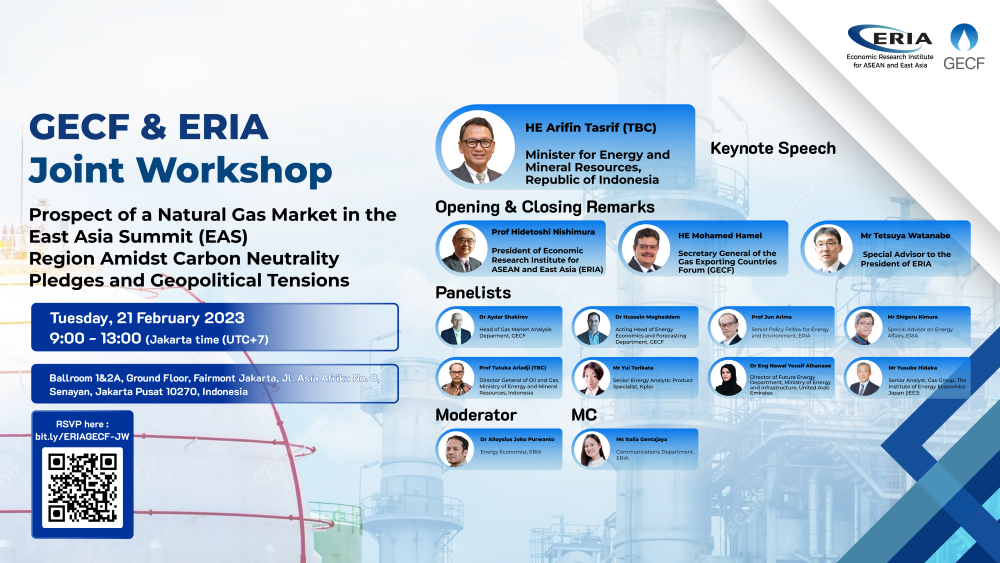Press Releases
News

Tue, 21 February 2023
The world is going through a complex energy crisis, and natural gas is just a single dimension of it. For the first time, energy is traded at a global level and has become more interrelated than ever before. Therefore, the consequences of the energy crisis are being felt across countries and industries in more acute ways.
First, natural gas markets had already been tight before the outbreak of the Russia–Ukraine conflict in February 2022 due to underinvestment since 2015, the coronavirus (COVID-19) pandemic along with the rapid but uneven post-COVID-19 recovery, and disrupted supply chains - primarily commodity supply chains. As a result, the supply of energy was not able to catch up with the robust, resilient demand during the recovery.
Market developments in 2022 exacerbated the heightened challenges for the gas industry. Global gas consumption declined for the second time in three years due to a combination of a mild winter season, a gas supply crunch, and record high spot gas and LNG prices which skyrocketed due to growing concerns about supply security as Europe’s LNG demand surged to replace Russian pipeline gas. Several developing Asian countries, particularly in Southeast Asia, were forced to switch from gas to coal to ensure their energy needs were met.
At the same time, the Energy Outlook (Kimura and Han, 2021) by the Economic Research Institute for ASEAN and East Asia (ERIA) estimated that the 17 countries of the East Asia Summit (EAS) would need to invest about $5.93 trillion in power generation and other energy infrastructure to meet electricity demand by 2050. This would entail an aggressive shift to variable renewable energy (VRE) such as solar photovoltaic and wind to achieve more ambitious energy-saving targets and more rapid advances in low-carbon energy technologies and renewable energy..
Furthermore, the world economic center of gravity continues to shift to developing countries as non-OECD countries, especially developing Asia, continue to catch up in multi-factor productivity. According to the 2022 edition of GECF Global Gas Outlook 2050, the real GDP of non-OECD Asia is expected to more than triple between now and 2050. The Chinese and Indian combined GDP is expected to reach US$70 trillion in 2050, or the equivalent of the US and EU combined, a much higher proportion than the current 45%.
Given a substantial reliance on coal in the region, the main trait that unites ASEAN and East Asia countries is a strong policy push to improve air quality as well as reduce pollution and greenhouse gas emissions. In this context, natural gas, the cleanest burning hydrocarbon, will play a prominent role to sustain economic expansion and meet growing demand for clean energy. As part of the long-term decarbonisation solution, natural gas will be a viable coal substitute and provide required flexibility to balance increasing renewables penetration.
The Asia Pacific – primarily South and South East Asian countries – will continue to play a leading role as key liquefied natural gas (LNG) importers, driving growth as LNG is gaining momentum and becoming the preferred natural gas supply source.
It is worth noting that natural gas will contribute to reducing GHG emissions through its expanded use – not only in the initial stage of the clean energy transition (2020-2030) when applying existing and affordable fuels or energy technologies is the main measure for reducing GHG emissions, but also in the longer term (2030–2050) when more advanced low-carbon technologies such as carbon capture, utilization, and storage (CCUS) and blue hydrogen will be deployed at a much greater scale.
Within this context, ERIA and GECF will hold a joint workshop to discuss the natural gas market in the EAS region. First, GECF experts shall set the scene by presenting natural gas market current conditions and immediate prospects, as well as the global gas outlook. Second, ERIA experts shall present the EAS region energy outlook and the roadmap of the Southeast Asia Nations (ASEAN) region to reach carbon neutrality. Finally, representatives from gas exporting countries, ASEAN countries, and experts on the EAS gas market shall examine the current challenges and opportunities faced by the countries and the regional gas market.
Date: Tuesday, 21 February 2023
Time: 9:00 AM - 13:00 PM (Jakarta Time | GMT+7)
Place: Fairmont Jakarta / Hybrid Event
Agenda
08:30-09:00 | Registration |
09:00-09:20 | Opening Remarks
|
09:20-09:35 | Keynote Speech:
|
9:35-09:45 | Photo session & break |
09:45-10:30 | Session I: GECF presentations
|
10:30-11:15 | Session II: ERIA presentations
Q&A |
| 11:15-11:25 | Break |
| 11:25-12:55 | Session III: Panel discussions Moderator: Dr Alloysius Joko Purwanto (ERIA) Panellists:
|
| 12:55-13:00 | Wrap-up and closing remarks
|
13:00-14:00 | Lunch (provided by ERIA) |
Invitations | Publications | Newsletters